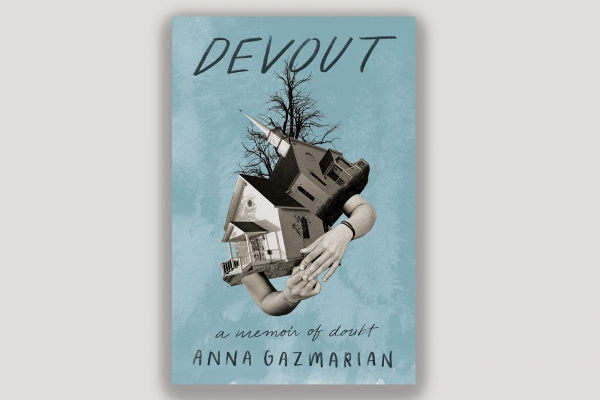AT 16, WHEN I finally named that I had an eating disorder, I stood in the doorway of my bedroom and Googled “patron saint for people with eating disorders.” Knowing I needed help, I first looked for guidance in my faith tradition. It began a lonely and shaky journey of figuring out what faith means in the context of my yearslong struggle, why this was happening, and what to do when answers weren’t there.
Anna Gazmarian’s Devout: A Memoir of Doubt traces her evangelical upbringing and bipolar diagnosis as she searches “for a faith that can exist alongside doubt, a faith that is built on trust rather than fear.” Growing up, Gazmarian was taught in church that depression signals a lack of faith, recalling a time a pastor told the congregation that his bipolar diagnosis was caused by his own sin. As she seeks treatment, Gazmarian engages with scripture through her experiences of mania and depression, doubt and despair, looking for validation and comfort between the lines of Bible verses.
Gazmarian’s prose is clear, engaging, accessible, and alive. With gentleness and compassion — toward herself and all who struggle with mental health — she writes about how she learns to believe that God is with her.
In one scene, Gazmarian describes opening up about depression at a Cru (Campus Crusade for Christ) small group gathering. Aiming to comfort, a woman quotes Revelation, reminding Gazmarian that heaven is a place with no more “mourning or crying or pain.”
“As someone fighting to stay alive and taking medications to prevent thoughts of death, I couldn’t take solace in the afterlife,” she writes. “I wondered whether Jesus ever thought about taking his own life, whether my obsessive thoughts would have been relatable to him...The image of Jesus wandering through the desert alone for forty days while Satan offered quick exit plans mirrored my own loneliness and despair. Pondering this story, I felt relief.”
Gazmarian doesn’t abandon the faith she grew up with; she tries to find something redemptive and trustworthy within it. “Perhaps I was too scared to walk away, to lose what shaped me,” she writes. “Or maybe this endless search for God among broken systems, the belief that Christ existed beyond the mistakes of people in positions of leadership, maybe that was what it meant to practice faith.”
Poetry becomes a lifeline for Gazmarian. In a college poetry class, she finds, for the first time, a real sense of belonging and church. “I was learning how to write the truth, which felt like a form of redemption,” she reflects. “Each poem was a plea to God to make himself known to me in a new way. It took me years to realize that writing was my preferred way of praying.”
That day at 16, I read about St. Catherine of Siena, who is thought to have struggled with disordered eating herself, and I felt that I wasn’t all alone. “Christ understood the extent of my pain in ways that no one else did,” Gazmarian writes. For those untangling from harmful expressions of religion, for those who know despair, Devout is a reminder that “you don’t need to be a high priest, or a pastor, or even an especially spiritual person to know God.” Gazmarian knows “you can be exactly the person you are.”

Got something to say about what you're reading? We value your feedback!







